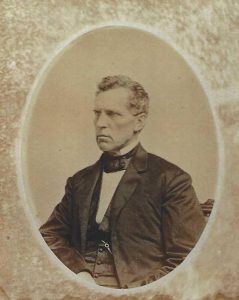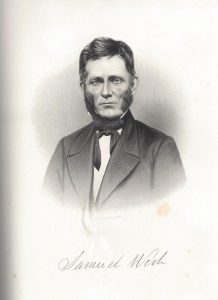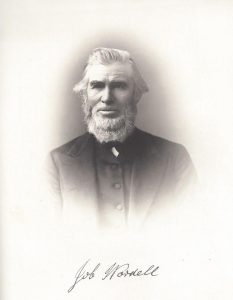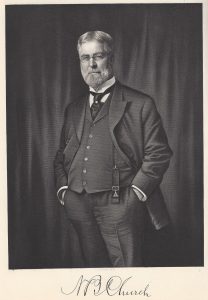Tiverton’s 19th century men were instrumental in making the Town what it is today. From caring for the poor and sick, running the Town government, advocating for the public schools, establishing community libraries, and creating a major fishing industry to put Tiverton on the map, not to mention the start of tourism in the area outside of Newport and Boston, Tiverton should be proud of the men who shaped it in this century.
Only a few are mentioned here: Job Wordell, Thomas Whitridge, Captain Nathaniel Church, Dr. Samuel West, and A. Lincoln Hambly. Their contributions to the Town are briefly detailed below.
 Thomas Whitridge was born in Tiverton in 1802, the third of nine children of Dr. John Whitridge. He moved to Baltimore and became one of the largest importers of coffee. His fortune enabled him to endow the first $1,000 toward the erection of Whitridge Hall for the “purposes of religious, charitable and literary culture, and the promotion of liberal religious thought.”
Thomas Whitridge was born in Tiverton in 1802, the third of nine children of Dr. John Whitridge. He moved to Baltimore and became one of the largest importers of coffee. His fortune enabled him to endow the first $1,000 toward the erection of Whitridge Hall for the “purposes of religious, charitable and literary culture, and the promotion of liberal religious thought.”
At various times, Whitridge Hall’s Bowen Memorial Chapel was used by Episcopalians, Catholics, and Unitarians. Sermons were delivered there by Julia Ward Howe and Edward Everett Hale.
One of the most important educational influences in the community was the inception of the Free Library and Reading Room at Whitridge Hall, to which William Whitridge donated more than 1700 volumes. Charles Seabury and his daughter, Mary J. Stimson failthfully served the Free Public Library for over fifty years.
Whitridge Hall and Bowen Memorial Chapel became the precursor of what is now the Tiverton Historical Society.
Thomas Whitridge died in Baltimore in 1883.
 Samuel West was born in Tiverton in 1806, the son of Dr. Samuel and Mary Whitridge West. His grandfather on his mother’s side was Dr. William Whitridge, who was also a widely known physician and a man of marked ability. West graduated from Brown University and went on to receive an M.D. degree from Harvard Medical School in 1831. He began his practice in New Bedford, but found it necessary to return to Tiverton following his father’s death.
Samuel West was born in Tiverton in 1806, the son of Dr. Samuel and Mary Whitridge West. His grandfather on his mother’s side was Dr. William Whitridge, who was also a widely known physician and a man of marked ability. West graduated from Brown University and went on to receive an M.D. degree from Harvard Medical School in 1831. He began his practice in New Bedford, but found it necessary to return to Tiverton following his father’s death.
He assumed the management of his father’s large farm, and entered actively in a medical practice that extended not only throughout the Town of Tiverton, but into Little Compton, Fall River, and Westport.
Dr. West married Mary Durfee in 1869 and built a home on rising ground that gave him a view of Narragansett Bay.
He had a deep interest in the public welfare and was an ardent advocate of temperance. Although he had no children, he was a steadfast friend of the public schools. He was in every sense a conscientious and honest man. Dr. West was much respected as a physician and as a man with strong convictions on almost every subject that commanded public attention. He died in Tiverton at age 73 in 1879.
 Job Wordell was born in Tiverton in 1820 to David and Innocent Brayton Wordell. He became a member of the household of Dr. Samuel West, and remained there for six years. He worked on various farms until 1844, when he began farming for himself on rented land in Tiverton. In 1849, he went off to discover gold in California, toiling there for four years where he met with some success.
Job Wordell was born in Tiverton in 1820 to David and Innocent Brayton Wordell. He became a member of the household of Dr. Samuel West, and remained there for six years. He worked on various farms until 1844, when he began farming for himself on rented land in Tiverton. In 1849, he went off to discover gold in California, toiling there for four years where he met with some success.
He returned to Tiverton and married Lydia Ann Gray and became the superintendent and keeper of the Town Asylum for the poor. He held various Town offices, including five years on the Town Council and several years on the Board of Assessors. He was one of the founders of the Tiverton and Little Compton Fire Insurance Company, and had been its treasurer and agent, as well as a director. It is said he never missed a meeting of the Board of Directors.
Job died in 1907, and was described as a kind and genial man who was bitterly opposed to anything unsavory or dishonest.
 Captain Nathaniel Church was extensively engaged in the menhaden fish, oil, and guano business along the Atlantic coast. He was born in Tiverton in 1845, the fifth of seven sons of Captain Joseph and Jemima Boomer Church. After spending many years on the water as master of several vessels, he designed and had built the George W. Humphrey steamer in 1877, which he commanded successfully for 17 years. This steamer was the most successful and profitable fishing vessel ever built.
Captain Nathaniel Church was extensively engaged in the menhaden fish, oil, and guano business along the Atlantic coast. He was born in Tiverton in 1845, the fifth of seven sons of Captain Joseph and Jemima Boomer Church. After spending many years on the water as master of several vessels, he designed and had built the George W. Humphrey steamer in 1877, which he commanded successfully for 17 years. This steamer was the most successful and profitable fishing vessel ever built.
After selling his interest in his family’s company, Joseph Church & Sons (aka Seven Brothers), to his brother Daniel, he went to New York and ultimately formed the American Fisheries Company which took over nearly all the menhaden properties along the coast.
He married Mary Humphrey in 1871, and later married Rhoda Louise Seabury in 1879 after the death of Mary. His large house, stables and carriage house, and boathouse (where many Town meetings were held) were on the point of Nanaquaket overlooking Tiverton Basin.
He held many prominent positions in both Tiverton and the State level, including Town Council, the Tiverton Board of Police Commissioners, the State Legislature and Senate, and was a member of the board that rebuilt the Stone Bridge. He died in 1916.
